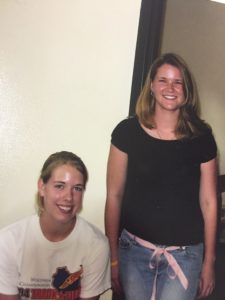For the first time since Labor Day, I don't owe anyone anything. I've met all my deadlines, and I'm project-less (at least I am until copyedits come back on two of my books). It's glorious. I've been taking this rare free time to read, cook, catch up on Outlander, and do some serious spring cleaning. But while I was totally on board with deep cleaning my apartment and sorting clothes for donation, I kept ignoring the big task that's sat on my to do list for years: cleaning out my box of old writing.
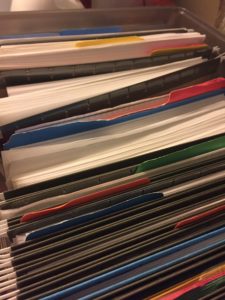
About seven years ago, when I moved into an apartment with my friend on the Upper East Side, I bought myself a huge plastic filing bin and a bunch of folders. I printed off all the old ideas that had just been sitting on my laptop, and started organizing. I filed away a whole bunch of concepts, character sketches, plot maps, synopses, and in some cases partial manuscripts of up to 45,000 words. Then I never looked at anything in that box again.
I'm sad to say, that box moved with me and has been sitting on top of the cabinets in my studio for five years.I'm not even sure I opened it up to add things. Sunday night, I decided that enough was enough. I had to sort through every piece of paper in there and figure out what to keep and what to toss.
I learned a lot in the two hours it took for me to sort everything in my box. I haven't had a chance to read everything in it (there's only so much wine in the world and I can't drink it all in one nostalgia-laden, cringe-worthy old writing session). I do plan to read everything, however, because among all of the — sometimes very — rough sketches in there are some ideas. Some good ones. Ones that could at some point become books.
So, here's what I learned when I made myself look at all of the ideas I thought were good enough to write down seven years ago.
Be prepared.
Yeah, you should probably be ready for a few "Why did I write that?" and "Wow, that's better than I thought" moments, but that's not what I'm talking about here. To go down nostalgia lane, you need to be properly prepped with tools. I dragged out a trash bag, mixed myself a Negroni, put on Hasley's BADLANDS, and set to work.
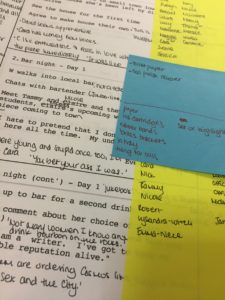
I like organization...and that's not necessarily a great thing.
The first thing that jumped out at me when I started attacking my mound of paper was that I like organization. Like really like it. My box of concepts was stuffed full of neatly printed, binder clipped paper. Everything was grouped with its appropriate project (some of them have amazing names, but more on that later). Things were split into folders that I'm sure made plenty of sense seven years ago. Everything looked neat.
Same goes with the content of those files. I always thought of myself as a pantser until I buckled down and started writing really serious. Now I will not start a project without at least a synopsis and often a few notes on character, plot, timeline, etc. mostly because I can't remember the details of what I pitched if it's not written down. If my agent sells a series, I need to remember months down the line what books two and three are supposed to be about. I thought I'd become a plotter because of professional survival.
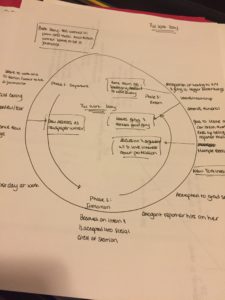
Turns out, I loved plotting when I was starting out. I had notes. I had deeply detailed character descriptions. I had synopses. I was all over the organization...
...so where are all of the manuscripts that should have come from such excellent plotting?
Some just didn't work. It happens. Not every idea becomes a book. Some manuscripts can be fixed, but I've also written a few that couldn't.
What concerned me a lot more was that I could see a bad pattern developing in this box. I used plotting as a crutch. If I broke a plot down in every possible way I could think of, I could tell myself that I was still doing work even if I wasn't producing workable, completed drafts. But look! I had all of this paper. I was working.
Nope. That's busywork and not productive work.
Breaking out of the habit of constantly researching and making notes is another long blog post, but suffice it to say I did it out of necessity. I made deadlines and forced myself to stick with them. Suddenly I couldn't spend days ripping apart a manuscript that wasn't even close to being complete. Making myself put together a manuscript and start submitting it to agents changed a lot of things.
I'm an office supply junkie.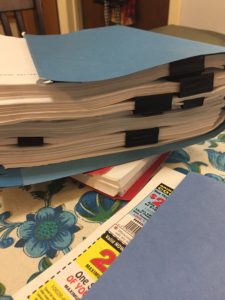
I pulled a lot of binder clips off of duplicate manuscripts. A lot. I have so many hanging and regular folders, I shouldn't be allowed into a Staples unattended ever. Same goes for stationary stores. How many legal pads does one woman really need?
My sister was a pretty good editor when she was 20.
It's generally not good when someone unequivocally hates your main character. It's generally great when they tell that to your face and don't let you write a bad book that no agent or editor is going to want to buy because of an odious heroine.
And yes, I did read that the first chapters of that manuscript. My heroine was pretty horrible. My sister will be so pleased to hear me tell her she was right (she's also now in a publishing grad school program so good call, baby sis).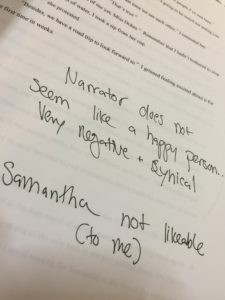
A lot of it is bad, but it's still my work and that's pretty cool.
I wasn't as embarrassed as I thought I'd be going through this box. I actually kind of wish one of my close friends was with me so we could comb through the pages. I think it would have been fun.
Don't get me wrong — a lot of what was in this box was bad. Like cringe-worthy bad. But most of it was also straight from brain to paper. It was rougher than a rough draft, and that's okay. What I had was a box of fresh ideas that I was excited about enough to jot down and store away.
I'm looking forward to going through my box of ideas slowly and seeing what's in there. Maybe nothing is usable. Maybe something becomes a book or a series. It's the promise of possibility that's exciting.
Writing makes you a stronger writer.
Someone I was once close with used to love Malcolm Gladwell and his 10,000 rule. The short version is that Gladwell argues it takes 10,000 of practice to become an expert at something whether it's hockey, piano, whatever.
While I don't completely buy into Gladwell's argument, I do think that consistent, conscious engagement with writing will make you a stronger writer. You've got to be open to learning and mentoring and criticism, but if you put in the time consistently your writing will change over time.
This box represents lots of hours and lots of writing. Butt in chair, hands on keyboard writing. Is all of what I wrote in 2008 good? Nooooo. But did I get better? Yes.
When I told my old roommate I was digging through my writing from when we lived together and that some of it was "utterly awful stuff," she said something really smart:
"We all do this. We all look back on old work and think it's terrible. It means you're growing!
And you'll grow until you stop."
She's a pretty brilliant lady.
You'll find some gems.
If you're like me, you'll uncover some gems while digging around in your own box of concepts. I found four rejections from when I submitted a literary short story to a bunch of journals. Those make me laugh now, but the thing that made me happiest was finding an old photo from college. It was taken on move-in day of my freshman year with my roommate who would go on to become one of my two closest girlfriends in college.
So enjoy this photo of me as an 18-year-old with a ribbon belt (thanks, 2004), and I hope you'll be kind to your past self when you tackle your own spring cleaning.
